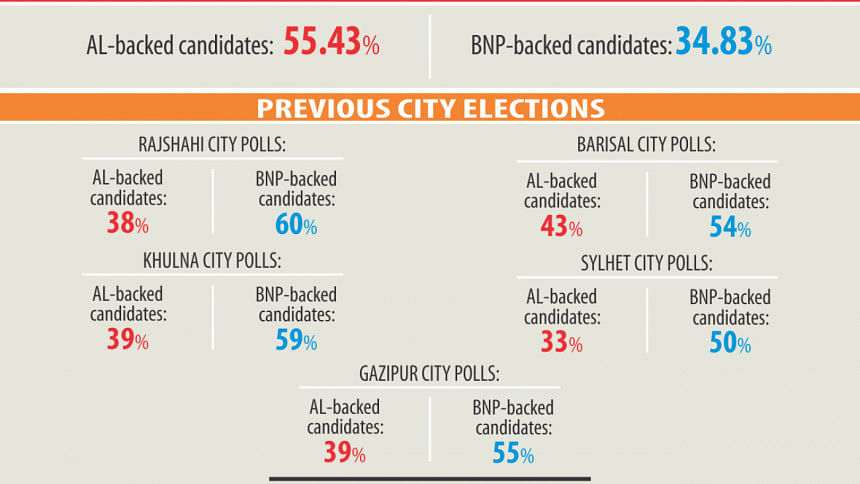Morning promised good day for BNP

The results of Tuesday's battle of ballots in three city corporations offer much food for thought.
Three BNP-backed mayoral aspirants together polled 9.24 lakh votes, around 35 percent of the total votes cast, even though they boycotted midway through the polls.
Their rivals -- the ruling Awami League-blessed candidates -- who won the elections obtained 14.70 lakh votes, around 55 percent.
The results prompted many to think that the fight would have been close if the polls had been held in a free and fair manner and the BNP-backed candidates had not pulled out early.
The victory the AL-backed mayoral hopefuls secured was tainted by widespread irregularities.
The presence of voters in polling stations was fairly good, but it started to grow thin after the BNP announced pullout of its mayoral candidates around noon.
But when the election results came at night, it surprised many as the numbers showed the BNP-backed mayoral aspirants were not lagging much behind their rivals.
In Dhaka North City Corporation (DNCC), BNP's candidate Tabith Awal bagged 3.25 lakh votes, some 1.35 lakh less than mayor-elect Annisul Huq. The difference of votes between the two contenders is not unusual as such gaps were also found in the previous city elections, which were highly competitive.
Take, for example, the Gazipur city corporation polls of 2013. It was the last city polls before Tuesday's. BNP-backed mayor candidate MA Mannan won the polls by defeating his AL-backed rival with a difference of 1.06 lakh votes. The total number of voters in Gazipur was 10.26 lakh.
The Gazipur polls saw a turnout of 63 percent whereas in the DNCC the turnout was 37 percent of total 23.44 lakh voters.
Vote casting in the polls to the two Dhaka city corporations and Chittagong city corporation was around 44 percent, an official of the Election Commission told The Daily Star yesterday.
Figures from Tuesday's polls showed that the AL-backed mayoral candidate won by a 20 percentage-point margin.
Almost the same margin was visible between mayoral hopefuls in the highly competitive polls to four city corporations -- Rajshahi, Khulna, Barisal and Sylhet -- held in 2013.
In Rajshahi and Khulna, BNP-backed mayoral aspirants defeated their rivals blessed by the AL with the margin of 22 and 20 percentage points respectively.
It explains why political analysts believe Tuesday's voting results left a significant message to us, particularly to the government.
"The Awami League and the government have been claiming that people have rejected the BNP for its mindless violence in the last three months since January. But the vote that the BNP-supported candidates received proved the claim wrong," said M Hafizuddin Khan, a former adviser to a caretaker government.
"The government should take Tuesday's voting results into consideration and it should no more neglect the BNP. The government must come to an understanding with the BNP," he told The Daily Star yesterday.
Prof Nizam Ahmed, a parliamentary affairs expert, echoed similar views.
"The polls have sent a clear message to the government. It should not underestimate the BNP," said Prof Nizam, a teacher at Chittagong University.
Former chief election commissioner ATM Shamsul Huda, however, thinks the city polls raised hope for putting the country's politics back on the right track.
"But the way the polls were held has diminished the hope," he told The Daily Star.
Tuesday's polls are another example of how an election mired in allegations of rigging hurts the electoral system.
The electoral system was crippled in the one-sided January 5 parliamentary election last year. The upazila parishad elections in February-March in the same year, which were allegedly manipulated by the ruling party men, sent another fresh blow to the electoral system.
Political analysts believe electoral democracy is considered as the first step towards substantive democracy.
As M Hafizuddin Khan, Prof Nizam Ahmed and ATM Shamsul Huda have opined, the way the electoral democracy was damaged in Tuesday's polls has further diminished democracy in the country.

 For all latest news, follow The Daily Star's Google News channel.
For all latest news, follow The Daily Star's Google News channel. 



Comments